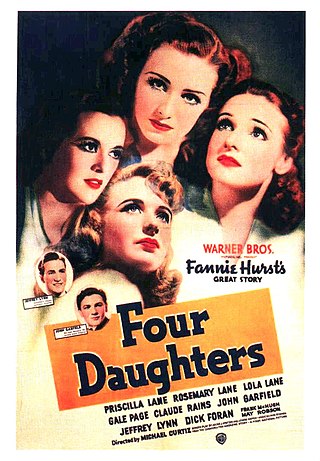
Four Daughters is a 1938 American romance film that tells the story of a happy musical family whose lives and loves are disrupted by the arrival of a charming young composer who interjects himself into the daughters' romantic lives. His cynical, bitter musician friend comes to help orchestrate his latest composition and complicates matters even more. The movie stars the Lane Sisters and Gale Page, and features Claude Rains, Jeffrey Lynn, John Garfield, and Dick Foran. The three Lanes were sisters and members of a family singing trio.

Oliver Burgess Meredith was an American actor and filmmaker whose career encompassed radio, theater, film, and television.

Donald Cecil Porter was an American stage, film, and television actor.

Conquest is a 1937 American historical-drama film directed by Clarence Brown and starring Greta Garbo, Charles Boyer, Reginald Owen. It was produced and distributed by Metro-Goldwyn-Mayer. It tells the story of the Polish Countess Marie Walewska, who becomes the mistress of Napoleon in order to influence his actions towards her homeland. The supporting cast includes Alan Marshal, Henry Stephenson, Leif Erickson, Dame May Whitty, George Zucco, and Maria Ouspenskaya.

John Elmer Carson, known as Jack Carson, was a Canadian-born American film actor. Carson often played the role of comedic friend in films of the 1940s and 1950s, including The Strawberry Blonde (1941) with James Cagney and Arsenic and Old Lace (1944) with Cary Grant. He appeared in such dramas as Mildred Pierce (1945), A Star is Born (1954), and Cat on a Hot Tin Roof (1958). He worked for RKO and MGM, but most of his notable work was for Warner Bros.
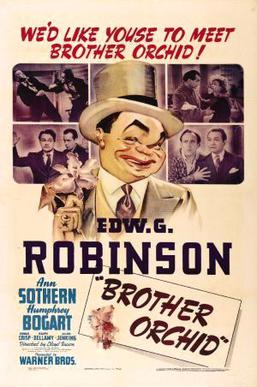
Brother Orchid is a 1940 American crime/comedy film directed by Lloyd Bacon and starring Edward G. Robinson, Ann Sothern and Humphrey Bogart, with featured performances by Donald Crisp, Ralph Bellamy and Allen Jenkins. The screenplay was written by Earl Baldwin, with uncredited contributions from Jerry Wald and Richard Macauley, based on a story by Richard Connell originally published in Collier's Magazine on May 21, 1938. Prior to the creation of the movie version of Connell's story, a stage adaptation was written by playwright/novelist Leo Brady. The script was originally produced at Catholic University of America in Washington, D.C..

Tom, Dick and Harry is a 1941 American comedy film directed by Garson Kanin and starring Ginger Rogers, George Murphy, Alan Marshal, Phil Silvers, and Burgess Meredith. It was produced and released by RKO Radio Pictures. The screen play written by Paul Jarrico, Rogers was working on the film when she was awarded the Oscar as Best Actress for her 1940 performance in Kitty Foyle. It was her first film released after her Oscar win. It was remade as The Girl Most Likely (1957), a musical which was also the last film released by RKO.
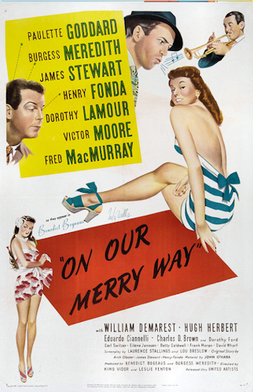
On Our Merry Way is a 1948 American comedy film produced by Benedict Bogeaus and Burgess Meredith and released by United Artists. At the time of its release, King Vidor and Leslie Fenton were credited with its direction, although the DVD lists John Huston and George Stevens, who assisted with one of the segments, as well. The screenplay by Laurence Stallings and Lou Breslow, based on an original story by Arch Oboler, is similar in style to that of Tales of Manhattan (1942), another anthology film made up of several vignettes linked by a single theme. The picture stars Paulette Goddard, Burgess Meredith, James Stewart, Henry Fonda, Harry James, Dorothy Lamour, Victor Moore and Fred MacMurray. It marks the first joint movie appearance of Stewart and Fonda, who play a pair of musicians in their section of the film.
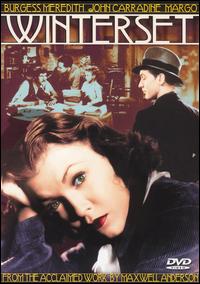
Winterset is a 1936 American crime film directed by Alfred Santell, based on the 1935 play of the same name by Maxwell Anderson, in a loose dramatization of the Sacco and Vanzetti trial and execution in 1928. The script retains elements of the blank verse poetic meter on which Anderson based his 1935 Winterset Broadway theater production.
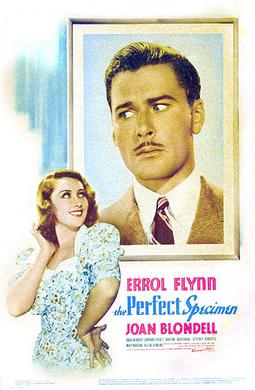
The Perfect Specimen is a 1937 American romantic comedy film directed by Michael Curtiz and starring Errol Flynn and Joan Blondell. The picture is based on a novel by Samuel Hopkins Adams.

Let's Fall in Love is a 1933 American pre-Code romantic musical film starring Edmund Lowe and Ann Sothern. Released by Columbia Pictures, the film was directed by David Burton and written by Herbert Fields.

Golden Needles is a 1974 American action/adventure film starring Joe Don Baker, Elizabeth Ashley, Ann Sothern, Jim Kelly, Burgess Meredith, and Roy Chiao. The film was directed by Robert Clouse and shot on location in Hong Kong.
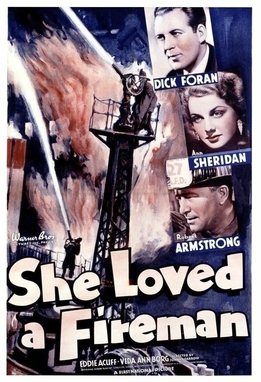
She Loved a Fireman is a 1937 American action drama film directed by John Farrow and starring Dick Foran and Ann Sheridan.
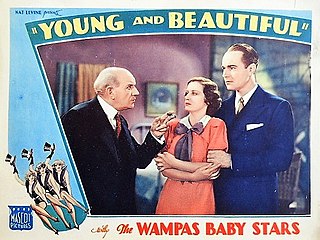
Young and Beautiful is a 1934 American romantic comedy film directed by Joseph Santley and starring William Haines and Judith Allen. The screenplay concerns a press agent who goes to great lengths to make his actress girlfriend a star, only to risk losing her in the process.

Super-Sleuth is a 1937 American mystery comedy film directed by Ben Stoloff. It was an early lead role for Jack Oakie. Super Sleuth was a remade in 1946 as Genius at Work, with comedy team of Wally Brown and Alan Carney.

Spring Madness is a 1938 American romantic comedy film based on the play of the same title by Philip Barry. It was directed by S. Sylvan Simon for Metro-Goldwyn-Mayer, and stars Maureen O'Sullivan, Lew Ayres, Ruth Hussey and Burgess Meredith.
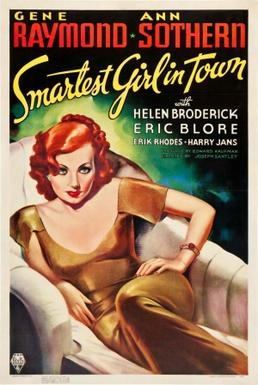
Smartest Girl in Town is a 1936 American comedy film directed by Joseph Santley, written by Viola Brothers Shore, and starring Gene Raymond, Ann Sothern, Helen Broderick, Eric Blore, Erik Rhodes and Harry Jans. It was released on November 27, 1936, by RKO Pictures.
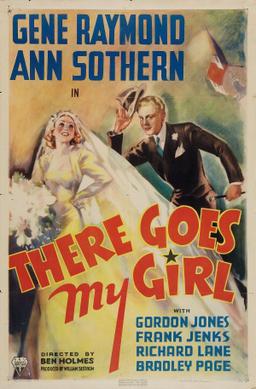
There Goes My Girl is a 1937 American comedy film directed by Ben Holmes, written by Harry Segall, and starring Gene Raymond, Ann Sothern, Gordon Jones, Richard Lane, Frank Jenks and Bradley Page. It was released on May 21, 1937, by RKO Pictures.

Dangerous Number is a 1937 American comedy film directed by Richard Thorpe and written by Carey Wilson. The film stars Robert Young, Ann Sothern, Reginald Owen, and Cora Witherspoon, and features Dean Jagger. The film was released on January 22, 1937, by Metro-Goldwyn-Mayer.

Panama Hattie is a 1942 American film based upon the Broadway musical of the same name. It was produced by Arthur Freed and directed by Norman Z. McLeod.




















